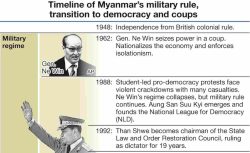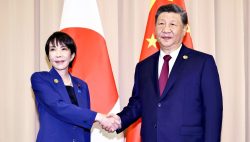Hyogo Governor to Lose Post: Is There Any Rational Reason to Run in The Next Election?
15:38 JST, September 27, 2024
It is obvious that there were problems with the prefectural governor’s handling of a whistleblowing case. The decision by the governor to run in the next gubernatorial election while ignoring the meaning of a no-confidence vote against him by the prefectural assembly is wrong.
Hyogo Gov. Motohiko Saito will automatically lose his post as of Sept. 30, but he has announced his intention to run in the next gubernatorial election.
In response to the no-confidence vote, Saito had the options of resigning, dissolving the assembly, or doing nothing and automatically losing his post. Although it is acceptable that Saito chose to lose his post, the problem lies beyond that.
At a press conference, the governor stated that he had not considered resigning or dissolving the assembly from the beginning. He may be trying to say that he will not resign because he is not at fault.
Saito said that he wondered if his series of problems was really something a governor should resign over, expressing his view that he cannot accept the no-confidence vote by the assembly.
The no-confidence vote was a result of the unanimous judgment by the assembly that the governor is not fit for the post. He pays too little regard to the consensus of the assembly members.
It is particularly difficult to understand his explanation about his intention to run again after losing his post.
There have been two governors in the past who ran in elections in response to no-confidence votes — former Nagano Gov. Yasuo Tanaka and former Tokushima Gov. Tadashi Ota. Both were at odds with their prefectural assemblies over political philosophies and policies, and ran in the elections to again seek the voters’ verdict on their appropriateness.
Those situations are totally different from this case where Saito’s very qualifications as a governor were questioned over his handling of whistleblowing.
The factor that led to the no-confidence vote was that Saito did not treat internal accusations by a senior prefectural official as whistleblowing, and that he took disciplinary action against the man after an investigation that was almost an interrogation by officials who were aides to the governor. The man died in July. It is believed to have been suicide.
The prefectural assembly’s special investigative committee has found that the handling by the governor and the prefectural government of the internal accusations violated the intent of the Whistleblower Protection Law, which prohibits the disadvantageous treatment of whistleblowers and the exposure of their identities.
It is unreasonable for Saito not to admit his own mistakes and to instead decide to try to remain in office by obtaining the endorsement of the people of the prefecture, just because the law allows him to do so. He should have honestly accepted the will of the assembly.
Saito explained that his reason for running in the election was to promote reform. If he were to be elected, he would serve a fresh four-year term, but it would be difficult to carry out any reform he envisages under the current circumstances in which he has lost credibility with the assembly.
The investigations by the committee and by a third-party investigative panel commissioned by the prefectural government are both expected to be completed by the end of the fiscal year. The governor’s heavy responsibility will be called into question anew once those probes reach their conclusions.
Since the internal accusations were made in March, confusion in the prefectural government has only deepened. The prefectural government must no longer continue to engage in politics without giving consideration to the people of the prefecture.
(From The Yomiuri Shimbun, Sept. 27, 2024)
Top Articles in Editorial & Columns
-

Myanmar Will Continue Under Military Rule Even After Election, Ex-Ambassador Maruyama Says in Exclusive Interview
-

40 Million Foreign Visitors to Japan: Urgent Measures Should Be Implemented to Tackle Overtourism
-

Expansion of New NISA: Devise Ways to Build up Household Assets
-

China Criticizes Sanae Takaichi, but China Itself Is to Blame for Worsening Relations with Japan
-

Withdrawal from International Organizations: U.S. Makes High-handed Move that Undermines Multilateral Cooperation
JN ACCESS RANKING
-

Univ. in Japan, Tokyo-Based Startup to Develop Satellite for Disaster Prevention Measures, Bears
-

JAL, ANA Cancel Flights During 3-day Holiday Weekend due to Blizzard
-

China Confirmed to Be Operating Drilling Vessel Near Japan-China Median Line
-

China Eyes Rare Earth Foothold in Malaysia to Maintain Dominance, Counter Japan, U.S.
-

Japan Institute to Use Domestic Commercial Optical Lattice Clock to Set Japan Standard Time



















